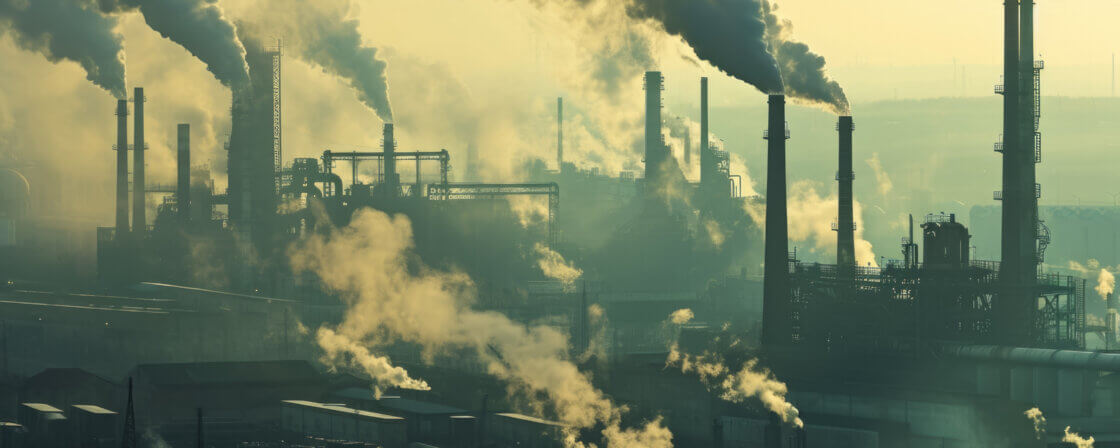The case known as Dieselgate has shaken the automotive industry and shown that manipulation of emissions tests can have far-reaching consequences not only for consumers but also for the environment. The scandal revealed that several car manufacturers, most notably Volkswagen, had installed software in vehicles that deliberately lowered the measured nitrogen oxide (NOx) emissions during testing . However, in real-life operation, these cars emitted up to several times more pollutants than permitted by European standards.
This case is not just a question of consumer deception or unethical business practices. It is about real environmental damage, which has resulted in increased concentrations of pollutants in the air, a deterioration in the quality of life of the population and impacts on human and ecosystem health. From a legal point of view, therefore, the question arises: who should be held responsible for this environmental damage and how? At a time when issues of sustainability and environmental responsibility are becoming increasingly important, this issue is more pressing than ever.
What the law says
The concept of environmental damage has a clearly defined meaning in Czech law and in the European context. According to the Act on the Prevention and Remedy of Ecological Damage, ecological damage means a negative measurable change in a natural resource, such as soil, water, protected species or natural habitats, caused by human activity. This law is based on the European Directive 2004/35/EC, which sets the framework for liability for environmental damage throughout the EU.
Unlike traditional property damage (e.g. destroyed property or reduced value of property), environmental damage is collective in nature. It does not affect individuals, but society as a whole. In the Czech legal system, environmental damage can be compensated mainly by public authorities – typically the Ministry of the Environment or municipalities – or by non-profit organisations dealing with nature protection.
In the context of Dieselgate, however, the situation is more complex. The environmental damage occurred en masse, across states, and without direct damage to specific land. Nevertheless, it can be argued that it was an infringement that resulted in increased emissions and thus environmental damage. In such a case, there should be a legal entitlement to redress or compensation – either in the form of financial compensation or through environmental measures.
Are you solving a similar problem?
Get fair compensation - don't let it go!
Have you been harmed by the actions of a large company or by environmental impacts? Whether it’s Dieselgate, air pollution or other environmental damage, you have the right to compensation. Our team of experienced attorneys can help you determine if you are entitled to compensation and take care of everything you need – from legal analysis to representation in court.
More information
- When you order, you know what you will get and how much it will cost.
- We handle everything online or in person at one of our 6 offices.
- We handle 8 out of 10 requests within 2 working days.
- We have specialists for every field of law.
Dieselgate as an example of environmental harm
The Dieselgate case has become a symbol of modern environmental fraud. While manufacturers claimed to meet emission limits, in reality their cars produced up to 40 times higher levels of nitrogen oxides, which are extremely dangerous for human health and nature. These substances contribute to smog, acid rain and worsen air quality, which has a direct impact on ecosystems and the health of urban dwellers.
From an environmental perspective, this is a typical case of collective environmental damage – millions of vehicles around the world have contributed to long-term pollution that cannot be easily eliminated. In some countries, such as Germany and the USA, this has been taken into account when imposing heavy fines on manufacturers. In the US, Volkswagen has had to pay more than USD 30 billion not only to compensate consumers, but also for environmental measures such as air restoration and investment in electric mobility.
In Europe, the situation is more complicated because the legal framework for environmental compensation is more fragmented. Nevertheless, it can be argued that Dieselgate represents a model case where it should be possible to claim environmental compensation – especially from the state or municipalities. They may have been harmed by increased pollution and should be entitled to seek redress in the form of compensatory measures or funding.
Consumer redress vs. environmental compensation
The Dieselgate affair has led to thousands of lawsuits around the world. While car manufacturers have paid out billions of dollars to individual customers in the US, consumer redress has been slower to take hold in Europe under Dieselgate. In the Czech Republic, aggrieved customers were able to join a class action lawsuit seeking compensation for the diminished value of the vehicle and the manufacturer’s deceptive conduct.
However, in terms of environmental law, a distinction must be made between private law consumer redress and public law compensation for environmental damage. While the former is directed at specific individuals, the latter concerns society as a whole. In the case of Dieselgate, it can be argued that, in addition to individual claims, there should also be collective environmental compensation aimed, for example, at improving air quality or promoting environmentally friendly transport.
In practice, such a measure has been implemented in Germany, for example, where part of the fines paid by the car manufacturer have been channelled into a fund for environmental projects. This approach sets an important precedent for other cases – it shows that corporate environmental responsibility can have not only a punitive but also a reparative dimension.
Tip for article
Tip: Are you considering buying an electric car and wondering if you can take advantage of the electric car subsidy? The state offers various forms of support that can reduce the price of a car by tens of thousands of crowns. Read on to find out what to do if the state denies you a subsidy for an electric car.
Precedents and current developments
The Dieselgate case has set a strong legal precedent. In Germany and other European countries, court rulings have begun to emerge which recognise the right of consumers to compensation and the responsibility of manufacturers for the environmental impact of their actions. In 2020, the European Court of Justice confirmed that the installation of so-called “defeat devices” is illegal and that manufacturers cannot claim that this was to protect the engine.
At the same time, the affair has opened up a wider debate about greenwashing and the responsibility of corporations for the environmental impacts of their actions. Many European countries have tightened legislation and are introducing new instruments such as class actions or green taxes to encourage companies to behave more sustainably.
Dieselgate has thus become a symbol of the transition from mere moral responsibility to real legal responsibility for the environmental impact of business. In the future, we can expect similar cases to become more frequent, for example in the fields of electromobility, resource extraction or energy. The right to a healthy environment is becoming an increasingly important part of the legal order and business ethics.
What if environmental damage has occurred in your country?
If an individual, municipality or organization believes that environmental damage has occurred, there are several legal options to defend yourself. The key is to identify the damage and prove a link to a specific action – in the case of Dieselgate, for example, the operation of cars that exceeded emission limits.
Injured parties can:
- File a complaint with the environmental authorities (e.g. the Ministry of Environment or the Czech Environmental Protection Agency),
- Bring an action for damages under the Civil Code,
- Engage in or initiate a class action if the harm is collective.
Legal representation by a lawyer is almost essential in these disputes, as the evidence and legal arguments are often complex. It is also important to keep an eye on the statute of limitations, which can run from the moment the victim becomes aware of the damage.
Municipalities or cities can also apply for compensation measures – for example, funding for air improvement projects or support for public transport. Such actions not only repair the damage caused, but also strengthen public confidence in the legal system and corporate accountability.
If you suspect that environmental damage has occurred in your area, do not hesitate to contact an expert. We can help you assess your case and suggest the most appropriate course of action to obtain fair compensation.
Tip for article
Hint: CEZ sued Greenpeace for misusing its advertising spot. While it found a defence in the court of first instance, the second instance court and the Supreme Court found in favour of Greenpeace. Read about the case between the two giants.
Summary
The Dieselgate case has shown that manipulation of emissions tests can have not only economic but also serious environmental consequences. The legal framework for compensation for environmental damage is based on the Czech Act on the Prevention of Environmental Damage and the European Directive 2004/35/EC, which impose an obligation to compensate for damage caused by pollution of land, water or air. Unlike ordinary property damage, ecological damage is of a public nature and can be claimed by the state, municipalities or environmental organisations. Dieselgate has thus become an example where a manufacturer should be held liable for increased emissions and deterioration of air quality, even if the damage has affected entire companies. In practice, compensation can be sought either individually, for example for consumers harmed by misleading behaviour, or collectively, through compensation funds and environmental measures. The Dieselgate case has also opened the way to wider legal responsibility for corporate environmental impacts and demonstrated the importance of actively protecting the right to a healthy environment.
Frequently Asked Questions
Who can claim compensation for environmental damage?
The remediation of ecological damage under the law is applied by the competent authorities (the Ministry of the Environment, the Czech Environmental Protection Agency, the regions); they impose corrective measures on the operator and recover the costs of remediation. NGOs and individuals can file complaints or participate in proceedings under special procedural rules; they can only claim monetary compensation for themselves for self-demonstrated damage under the Civil Code.
How is it proven that environmental damage has occurred?
The key is to demonstrate that an activity (e.g. operation of illegal emission vehicles) has led to a deterioration of a natural resource, the air or the health of the population. Proving this often requires expert opinions, emission measurements and expert reports.
Can environmental damages also be claimed in connection with the Dieselgate affair?
Yes, theoretically it can be argued that the manufacturer who manipulated emissions caused environmental harm. In practice, however, most lawsuits have focused on consumer redress, not on the environmental damage itself. Nevertheless, this case may serve as a precedent for similar environmental claims.
What is the difference between environmental damage and classic property damage?
Property damage relates to the specific victim and their property (for example, the depreciation of a vehicle). In contrast, environmental damage affects the whole environment – air, water or land – and concerns the public interest. It is therefore often claimed by the State or nature conservation authorities.
What should I do if I suspect environmental damage in my area?
The first step is to report the suspicion to the competent authority, usually the Czech Environmental Inspectorate (CIE) or the Ministry of the Environment. If you have also suffered direct damage personally, you can contact an attorney and consider filing a claim for damages or joining a class action.




